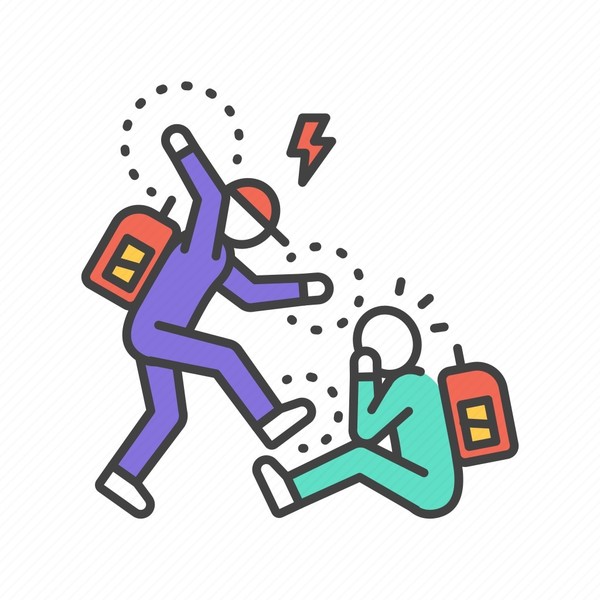
Currently issued topic The drama ‘The Glory’ by Kim Eun-sook, released in December 2022, follows the story of a school violence victim, Moon Dong Eun (played by Song Hye Kyo), who plans a grand revenge on her perpetrators. As the drama drew attention, past school violence incidents were re-examined and resurfaced through various SNS and communities. As school life takes up a large part of daily life for students, school violence is more harmful to students. Even worse, it can lead to victim’s suicide.
Then, how do we respond to school violence in the education field? Also, let's see which parts need to be improved.
School violence in Korea

Currently, in Korea, according to the School Violence Prevention and Countermeasures Act, it specified that the head of school must provide education to students for prevention of school violence (including the concept, reality and countermeasures of school violence) once or more times per semester. However, according to a survey conducted by the Ministry of Gender Equality and Family on the level of school violence prevention education, about 23% of students answered that prevention education was not helpful. This shows that most school violence prevention education is only in the form of theoretical lectures, so students can not focus on the necessity. It is also a problem that there is little intervention from teachers, police, and third-party students who did not feel the risk of school violence. This shows that regular preventive education at the institutional level does not seem to have much effect in practice.
Let’s take a look at the case of Pyo Ye-rim, who recently spoke through the MBC Silwha-tamsadae. In the case of Pyo Ye-rim, a victim of school violence, she told the school violence that she experienced. But instead of listening to her story, the teacher said, "Maybe you did something wrong, so other students acted like that." In reality, when an accident occurs, teachers become the target of responsibility, because they are pressured by the school organization due to the school image or an academic achievement record. So few teachers show an active attitude to school violence accidents. Passive attitude of those around victims leads to a vicious cycle of not reporting school violence although they keep being bullied. According to the actual survey about why students did’t tell what they experienced, 26.3% of the main reasons were because it’s no use saying.
Even if school violence is accused and the School Violence Disciplinary Committee is opened and disposition is received, the citation rate for suspension of execution in Korea is quite low. ( *Suspension of execution : A decision to temporarily suspend the effect of a disposition if it is recognized that there is a risk of irreversible damage.) In the last three years, the citation rate for suspension of school violence reached 57.9%, so measures to prevent secondary damage seem urgent.
The Ministry of Education is promoting measures to eradicate school violence. Representative examples include strengthening the preservation period of student records related to school violence and reflecting them in college entrance exams. Now the preservation period of the student records is only up to 2 years. If the bill is passed, it is expected that for students who are bullies of school violence, the records left in the school record book will be preserved for up to 10 years even after graduation. Also, actions recorded in the student record are reflected in the regular college admissions and even employment. In addition, it announced that various measures would be implemented such as expanding the participation of experts in investigation, strengthening civic education, and extending the scope of measures against school violence.
Compare our reaction with others
Then, how are other countries dealing with school violence? In the case of China, the Ministry of Public Security and the Ministry of Education cooperate to prevent and respond to school violence. If minors commit an illegal act, of course, they will be disciplined and take criminal responsibility according to the law. In addition, the minor's parents will be disciplined for failing to do their responsibilities. In the case of minors, the age limit for criminal punishment is 16 years old, but criminal punishment can also be imposed on teenagers between the ages of 14 and 16 in serious cases such as intentional murder, injury, arson, or explosion. In the case of Vietnam, they stipulate the application of legal measures against assailants by promptly reporting to higher authorities such as the central administrative agency in the event of school violence, as well as measures to protect victims.
As we have seen so far, it can be seen that the two countries presented above are measures that, similar to Korea, focus on strengthening punishment after the fact rather than fundamental prevention of school violence. So what does the fundamental solution we are talking about here mean? First of all, the change in the perception of school violence among students and parents must be based on proper school violence education that students can communicate and participate in. The most important part is making students aware that violence can be a ‘crime’.
What they really want
Writer Kim Eun Sook of the drama ‘The Glory’ said about the reason for the title,
"There's a reason why it's titled The Glory. Victims only want a genuine apology from their offenders. 'The Glory' is about recovering their dignity, honor, and glory that was lost to them the moment they fell as a victim to violence was genuine recovery for them."
Drama ‘The Glory’ is the way Kim Eun Sook shows her support for them by writing the story that Dong Eun can successfully carry out her revenge. Given that what the victims really want is to recover themselves, not a more powerful punishment, it seems that various measures should be considered with continued interest in the future. We have to consider our way of supporting them.

